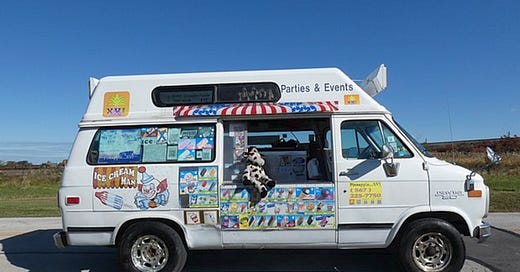Out of the gate, I should note that I’m dropping this newsletter down from once-a-week to twice-a-month. There’s plenty of reasons but the biggest one is that I’m plowing pretty hard through a big piece of writing and this-here newsletter doesn’t make much money. I’m barely reading anymore, and when I am, it’s more of a studying kind of reading. But you don’t care about this, the point is that I’m reading a lot of Carl Jung again.
Carl Jung is this Swiss psychoanalyst who came up with all these theories about how human beings work. And his big theory is something he called the collective subconscious. It’s tough to explain and every authentic definition comes off as mumbo-jumbo1 but the basic idea is that we’re born with certain concepts in mind.2 Water is cleansing, for instance. That’s why it’s featured in baptisms and flood narratives.
I don’t know if it’s true or not, but the collective subconscious is a nice theory. And without getting too hippy-dippy, it’s nice to think about. This idea that we’ve all got these basic concepts in common. And, because it’s nice to think about, I think about it a lot. I was thinking about it the other day when my kid and I were at the park and I heard the ice cream truck roll up.
My son is two, which is this bizarre age where he’s deciphering the world. He doesn’t really know what anything is, but he has a vague sense of everything. Case-in-point: I took him to a wrestling practice with me and he lost his mind when I was rolling around with the guys — he thought I was fighting. He was worried about me. He doesn’t know what fighting is — he’s never seen a fight — but he knows the idea of his dad in one is worth screaming over.
It triggered an instinct in me too — a protective adrenaline type-of-thing and the whole moment was a really interesting accidental experiment. And, because of it, I’ve gotten a little more studious of his instincts over the past month. What, I ask myself constantly, is he born knowing?
So, of course, when the ice cream truck rolls into the parking lot with its music just a-ringing, I turn to my son to see what he’ll do.3 He kind-of squints at it for a minute, trying to figure out where it fits in. And then he realizes, holy shit, there are little pictures of ice cream cones on the side of the truck. And he throws his hands in the air and runs like a house on fire.
So we had to get ice cream. I’ve got this theory of my own — that dadhood is half-parade and half-patience but that, every once in a while, you find a spot-of-gold. An experience so loaded with joy, you close your eyes and will it into a core memory. And the first time you and your kid go to an ice cream truck is one of those predetermined spots-of-gold. You’re not going to pass that up, you want that image forever.
But as we approach the ice cream truck, I realize there’s a problem of categorization. The eskimos, they say, have hundreds of words for snow. My son only has one word for ice cream. He doesn’t know popsicle or sugar cone or scoop. He only has ice cream. And so he’s pointing frantically at the ice cream truck sign, at all the rocket pops and snow-cones; at Spongebob and Spiderman and, at each of them, my kid is screeching ice cream! ice cream! ice cream!
So we go back and forth on it and finally, he picks out the Spongebob ice cream. He doesn’t know who Spongebob is, of course, but Spongebob is bright yellow and that stands out. So we’re there for a while and a crow comes hopping over beside us and my kid points at it and says bird. But then — and this is the unexpected spot-of-gold — he squints at it and says crow.
And it’s one of those moments — these happen a lot at two-years-old — where you, as a dad, want to stop the whole world. I’m sorry for the country-song cliche, but you just want to hit the pause button. You want Spongebob to be ice cream and crows to be birds. You know they can’t, of course. In twelve years, he’ll have the whole world defined and figured out and, as likely as not, he won’t have time for me. Ice cream trucks and crows will just be insolent noise.
But there for that little-bitty moment, you feel like you’re seeing the other side of the collective unconscious and — lucky for you — you’re getting all the good parts. You’re getting ice cream trucks and hours passed dreamily in a swing. You’re getting emotions with their faces undisguised by motives. And, because this is the end, we can discard with all the bunk and just sit back and say: well if this isn’t nice, then what is?
The most succinct mumbo-jumbo I can find comes from this intro of his: “in addition to our immediate consciousness, which is of a thoroughly personal nature and which we believe to be the only empirical psyche (even if we tack on the personal unconscious as an appendix), there exists a second psychic system of a collective, universal, and impersonal nature which is identical in all individuals. The collective unconscious does not develop individually but is inherited.”
Yes, yes, yes there’s all those thousands of very nice pages about the archetypes but I’m ignoring every single one of them for the sake of simplicity.
In my totally amateur armchair opinion, the ice cream truck music is not part of the collective unconscious. I do not believe the ice cream man is an archetypical image.






Beautiful